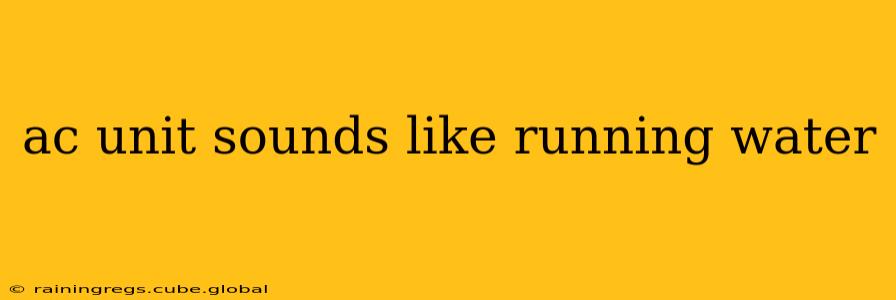Is your air conditioner making a sound like running water? This isn't necessarily a cause for immediate panic, but it's definitely a sign that something might be amiss. A gurgling, rushing, or splashing sound from your AC unit can indicate several problems, ranging from minor inconveniences to significant issues requiring professional attention. This comprehensive guide will help you diagnose the problem and find effective solutions.
Why Does My AC Sound Like Running Water?
The "running water" sound in your AC unit often stems from refrigerant issues, condensation buildup, or problems within the drainage system. Let's explore the most common causes:
1. Refrigerant Leaks
One of the most serious reasons your AC might sound like running water is a refrigerant leak. Refrigerant is crucial for cooling, and a leak reduces its efficiency. As the refrigerant escapes, it can cause a gurgling or bubbling sound as it flows within the system. This is a problem that needs immediate professional attention, as refrigerant leaks can damage the compressor and lead to costly repairs. Attempting to fix this yourself is strongly discouraged.
2. Condensation Buildup and Drainage Issues
Air conditioners produce condensation as they cool the air. This water typically drains away through a condensate drain line. However, if this line becomes clogged, the water can back up, leading to gurgling or splashing sounds. Additionally, poor insulation around the drain line can allow the water to drip or splash, creating a running water sound.
3. Frozen Evaporator Coil
A frozen evaporator coil can also create a sound similar to running water. Ice buildup can melt and drip, leading to a gurgling or splashing noise. This freezing typically happens due to restricted airflow, a malfunctioning fan, or low refrigerant levels. Again, this requires professional assessment and repair.
4. Dirty Air Filter
A clogged air filter restricts airflow, impacting the AC unit's efficiency and potentially leading to increased condensation and the aforementioned gurgling sounds. While not the most likely culprit of a running water sound, a dirty filter certainly contributes to AC problems that can indirectly cause such sounds. Regular filter changes are essential for optimal AC performance.
How to Troubleshoot the Running Water Sound
1. Check the Condensate Drain Line
Locate the condensate drain line (often a small pipe exiting the unit). Examine it for clogs. A simple solution might involve using a wet/dry vacuum to clear any obstructions. However, if the clog is deep within the line, professional help might be necessary.
2. Inspect the Air Filter
Remove and inspect the air filter. If it's dirty or clogged, replace it with a clean one. This simple step often resolves minor airflow issues that can contribute to condensation problems.
3. Check for Frozen Components
Carefully inspect the evaporator coil and other components for ice buildup. If ice is present, do not attempt to force it off. This could damage the unit. Instead, turn off the AC and call a professional HVAC technician.
4. Listen Carefully for the Source
Try to pinpoint the exact location of the sound. Is it coming from the indoor unit, the outdoor unit, or somewhere in between? This can help you narrow down the potential causes.
When to Call a Professional
If the sound persists despite your efforts, or if you suspect a refrigerant leak or frozen components, call a qualified HVAC technician immediately. Ignoring these problems can lead to further damage and costly repairs. A professional can diagnose the issue accurately and perform the necessary repairs safely and effectively.
Preventing Future Issues
Regular maintenance is key to preventing AC problems. This includes:
- Regular air filter changes: Change your air filter every 1-3 months, depending on usage.
- Annual AC inspections: Schedule an annual inspection by an HVAC professional to identify and address potential issues before they become major problems.
- Keep the area around the unit clear: Ensure adequate airflow around both the indoor and outdoor units.
By understanding the potential causes of the running water sound and taking proactive steps, you can ensure your AC unit operates efficiently and reliably for years to come. Remember, safety first—if you're unsure about anything, contact a professional.
